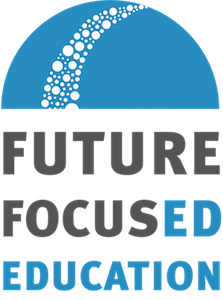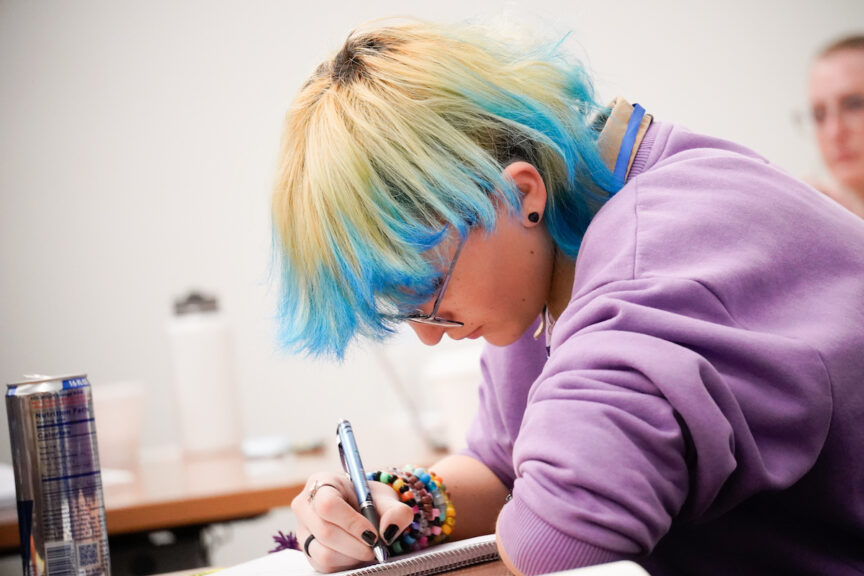Why Local and National Education Leaders Reject Standardized Testing
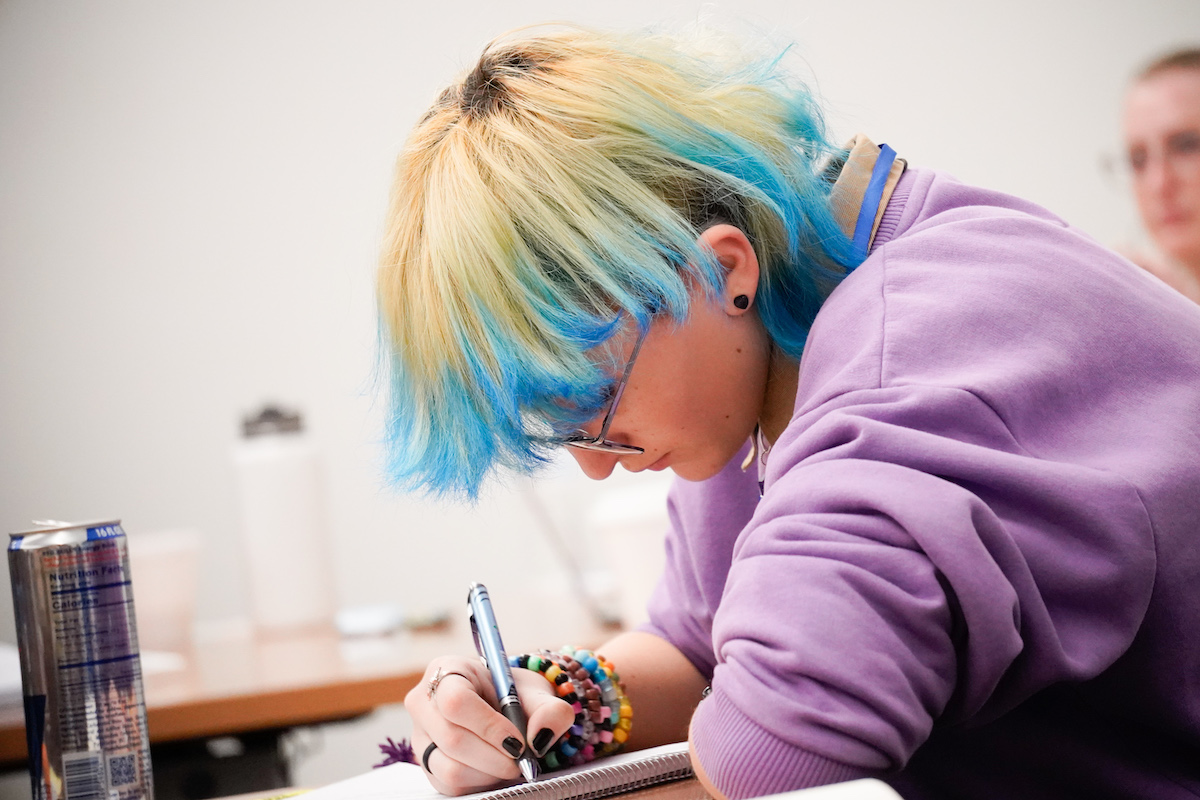
Over the past 20 years, public opinion has gradually shifted away from standardized testing as a measurement of student learning. The George Floyd uprisings, the COVID-19 pandemic, and our own attempts to deal with colonialism here in New Mexico have shed light on racial and social inequities in our communities. Yet, the allure of testing—and the unavoidable and damaging accountability measures that come with it—is still in the psyche of many New Mexicans in the education system. Grading schools and ranking and sorting young people based on a test is easy, but we cannot head back that direction. It’s time to make a new way for ourselves and for our young people.
The EQ2 initiative is one way Future Focused has answered the call for better assessment practices—with a strategy that bets on the skills, knowledge, and judgment of teachers rather than testing companies. Our research and development arm, Instituto del Puente, has also worked to change assessment in New Mexico by ensuring students can apply classroom learning to real-world tasks, not just fill in the blank tests.
Tiara Sibley, X3 Intern
“Standardized assessments were so deeply integrated into my identity as an Asian American in a culture dominated by White Supremacy,” says Tiara Sibley. “I lost sight of what my identity was and what my language meant to me.”
Sibley graduated from Amy Biehl High School in 2022. She first interned for Future Focused’s X3 internship program in 2021, then again in 2022 for her Senior Project. She is now in her second year of college at New Mexico State University studying Environmental Science.
Alongside the reformation of the education system, she found herself caring deeply about environmental justice. While it might not be readily apparent, she points out, environmental justice plays a huge role in preventing students from getting the education they desire and deserve. She wants to help young people reach their full potential by providing them with an equitable education that is not influenced by their environment, giving them an opportunity to those in developing nations.
Sibley has had the opportunity to complete an Honors Capstone and hopes to conduct research on a No Grade Plan which was established in her Honors First Year Seminar course.
Here’s what Sibley had to say about standardized testing from the perspective of a New Mexican student:
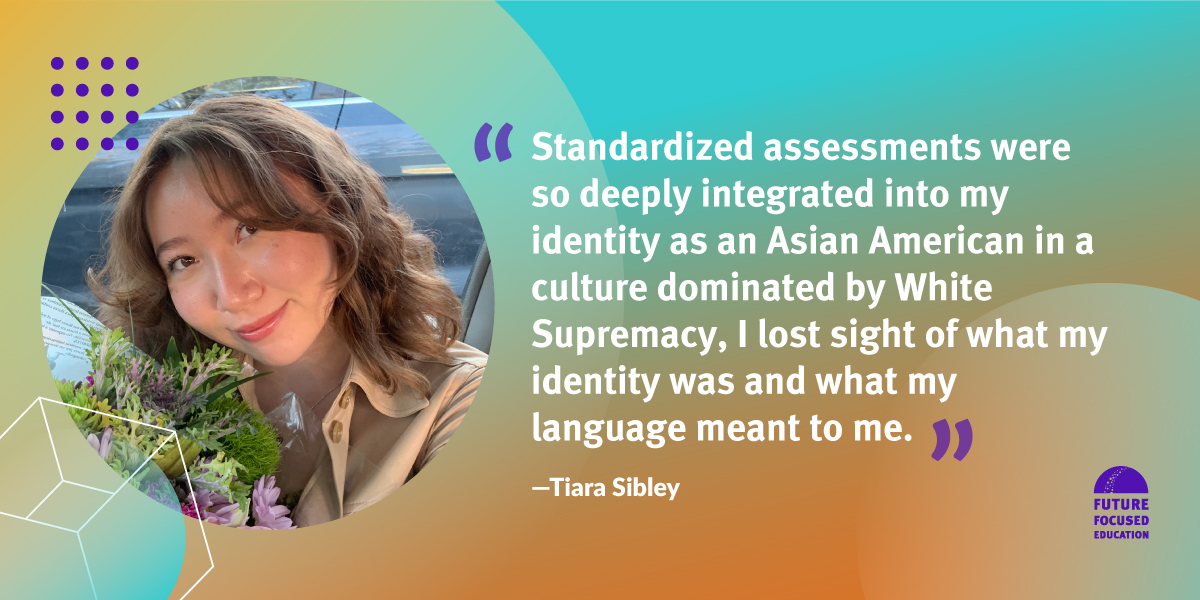
“While conducting research for my internships with Future Focused Education, I have heard many stories like mine, stories of being consumed by an oppressive system that stems from structural and inherent racism, and shared fears that change could not be made to current systems. I concluded that students should be able to pursue their passions while discovering their identities, nurturing their love for their communities in hopes of creating a more egalitarian system.”
“The goal for replacing standardized testing as demonstration of competency is to advance toward a classroom where no students feel left out or discriminated against; a place where no student feels like they are not enough,” she said.
“What a student can accomplish should not be controlled or limited. Through Future Focused, I have learned that there are many alternatives in reimagining assessment while encouraging students to be authentic. These include testimonios, autoethnographies, or capstones.
“Intercultural dialogue allows students from different backgrounds to uniquely bring their own experiences in education to a form that is more freely expressive than what a multiple-choice question can capture.”
Diane Ravitch, Network for Public Education
“Sometimes, the most brilliant and intelligent minds do not shine in standardized test because they do not have standardized minds,” writes Diane Ravitch.
Ravitch is the Founder and President of the Network for Public Education (NPE), and the author of The Death and Life of the Great American School System: How Testing and Choice Are Undermining Education.
Ravitch used to support standardized testing, but changed her mind based on the evidence. Here are some of the things she’s said:
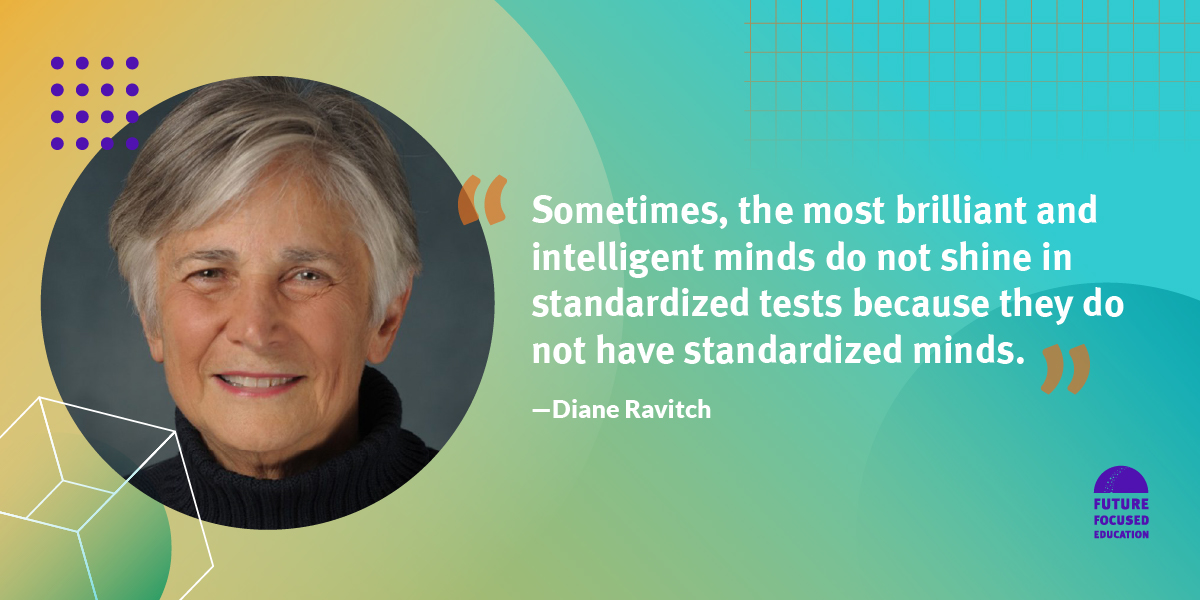
“Anyone who truly cares about children must be repelled by the insistence on ranking them, rating them, and labeling them. Whatever the tests measure is not the sum and substance of any child.”
“The tests do not measure character, spirit, heart, soul, potential. When overused and misused, when attached to high stakes, the tests stifle the very creativity and ingenuity that our society needs most. Creativity and ingenuity stubbornly resist standardization. Tests should be used sparingly to help students and teachers, not to allocate rewards and punishments and not to label children and adults by their scores.”
NPE has 350,000 followers and is the single largest organization of parents and teachers and other citizens working to stop the privatization of public education and the misuse of standardized testing. Its goal is OK to preserve, protect, and improve public schools.
Wilhelmina Yazzie, Freedom Fighter
“Standardized testing is not the answer to our education problems, it is a colonial tool created out of racist and biased tactics,” says Wilhelmina Yazzie. “It’s not our children failing these tests, it’s the tests failing our children.”
Yazzie is a Diné woman from Tséta’ Tóak’oolí (Casamero Lake, New Mexico). She made national news for advocating for her son, Xavier Nezbeing, as part of the Yazzie/Martinez lawsuit against the State of New Mexico in 2018. The lawsuit found that the State’s Public Education Department lacked support for low-income students, Native American students, English Language Learners, and students with disabilities. Since the lawsuit, Yazzie has continued to fight for more equitable education for Native American and New Mexican children. In 2022, she was named Woman of the Year by USA Today for her advocacy.
Recently, Yazzie said the following about standardized testing:
“In our Indigenous ways, our children’s achievement is about so much more than test scores. Our children are gifted in different ways with different cultural backgrounds. We need to start measuring what truly matters, the development of our children through their cultural backgrounds first. It is imperative that our schools incorporate culturally and linguistically responsive teaching and learning. If we are to focus on testing, it should be an authentic assessment of achievement that highlights student and community voices in a holistic approach.”
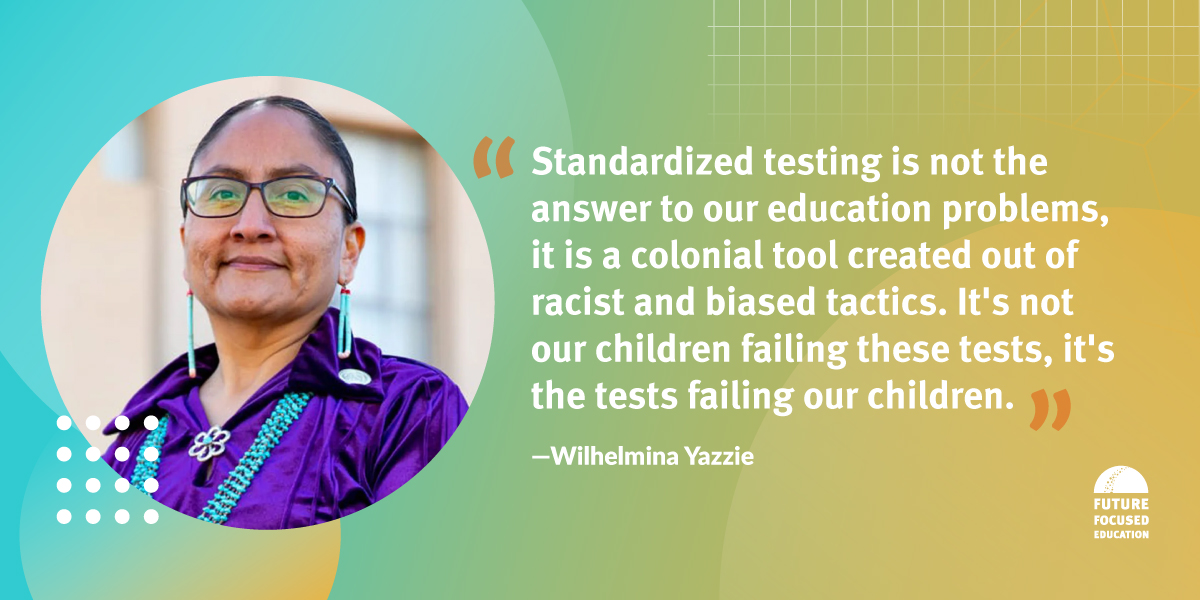
Scott Marion, National Center for the Improvement of Educational Assessment
“Our 20-plus-year obsession with standardization and comparability has hindered efforts to create more equitable school systems and learning opportunities for students,” writes Scott Marion. “It is time for a new approach.”
Marion is a national leader in designing innovative and comprehensive assessment systems to support both instructional and accountability uses. He is the Executive Director of The National Center for the Improvement of Educational Assessment and coordinates and/or serves on five district state Technical Advisory Committees for assessment, accountability and educator evaluation.
Marion has been critical of standardized testing for many years. Here are some things he’s said in a recent article for NCIEA.
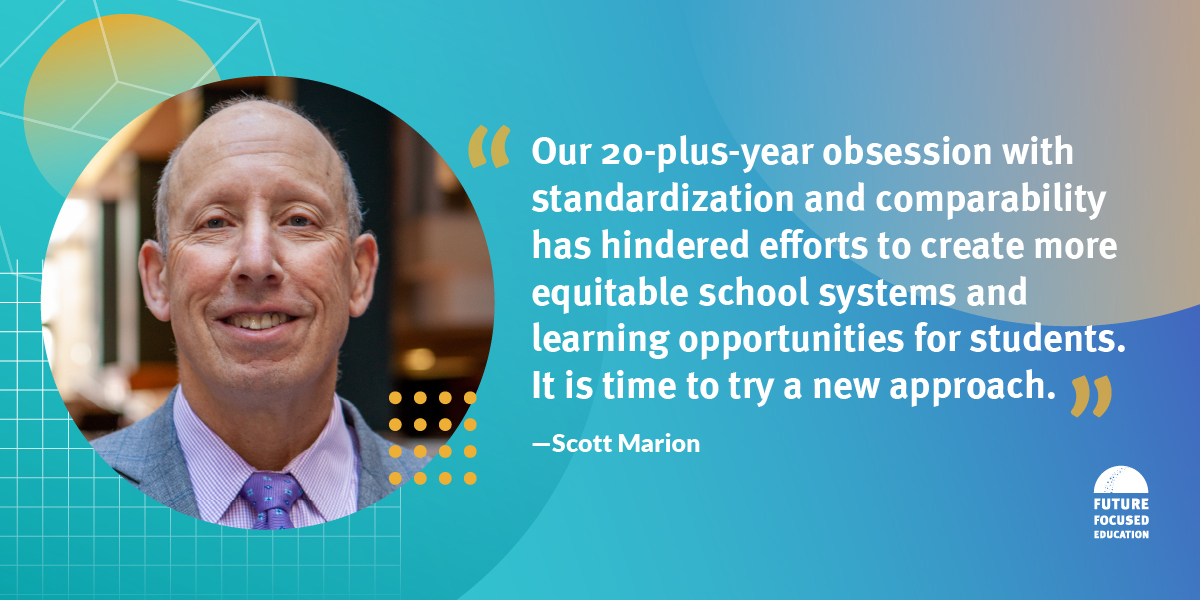
“Most people agree that the factory model of education doesn’t work. If we don’t want students learning the same knowledge and skills at the same time, as if they’re on one big conveyor belt, why would we require all the adults in K-12 education to use essentially the same accountability (or assessment) system?”
“We need to let states, districts, and schools create systems that hold them accountable for the distinctly different work each one does. We also need systems that recognize that states and districts are not interchangeable; each operates in a unique context.”
Jerome Haskie, Zuni Public School District Board of Education
“Because Capstone Projects rely on research and evidence-based development, the students have a greater opportunity to express thoughts through their classroom learning as well as identifying community issues to address,” says Jermone Haskie.
Haskie is an enrolled member of the Zuni Tribe of Indians from northwest New Mexico. He is married with two children and one grandchild. Mr. Haskie worked for the Pueblo of Zuni Fire Department attaining the rank of Chief until he was named as the Director of Public Safety. He retired from the Pueblo of Zuni after 27 years of service in 2005. Mr. Haskie has been a member of the Zuni Public School District Board of Education for the past 7 years. He currently serves as the President of the Board.
Mr. Haskie is a staunch supporter of youth academic achievement, athletic excellence and career readiness for students in the Pueblo of Zuni.
As President of the Zuni Public School District’s Board of Education, Haskie has overseen a lot of changes in approaches to assessment. When asked what he thought of standardized testing versus other methods, here’s what he had to say:
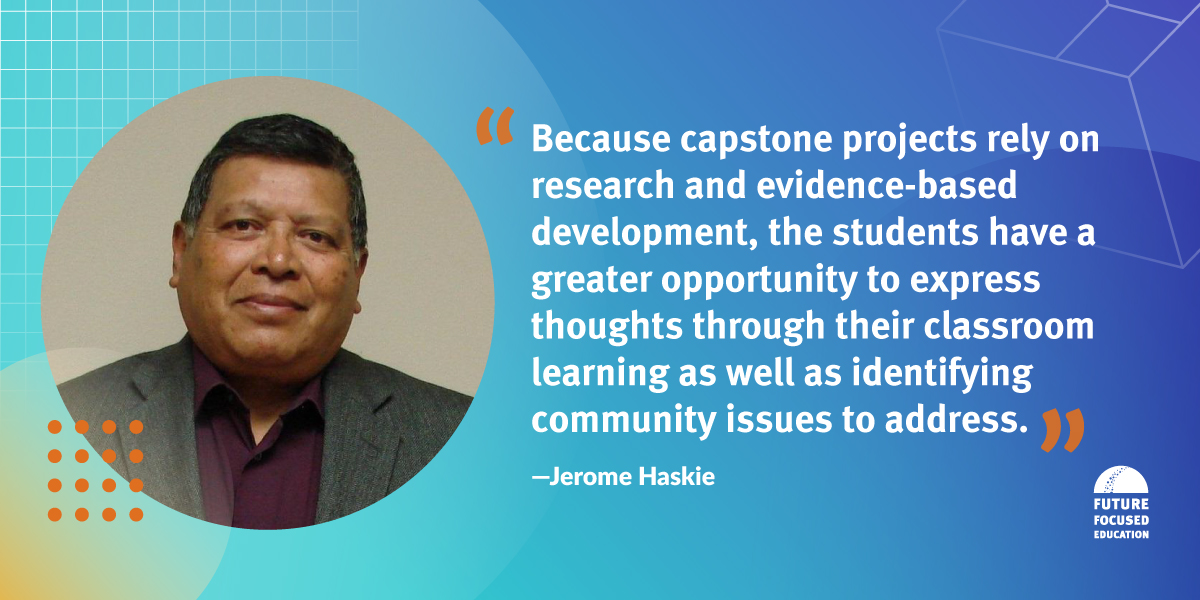
Thomas Arnett, Clayton Christensen Institute
“However, applying [standardized test] metrics to new educational programs can do more harm than good,” says Thomas Arnettt. “By holding these programs to the same standards, we risk pushing them towards the same conventional outcomes.”
Arnett is a senior research fellow for the Clayton Christensen Institute. His work focuses on using the Theory of Disruptive Innovation to study innovative instructional models and their potential to scale student-centered learning in K-12 education. He also studies demand for innovative resources and practices across the K-12 education system using the Jobs to Be Done Theory.
In a recent article published by the Christensen Institute, Arnett discussed how many unconventional approaches to education are still being assessed conventional ways—and why that doesn’t work:
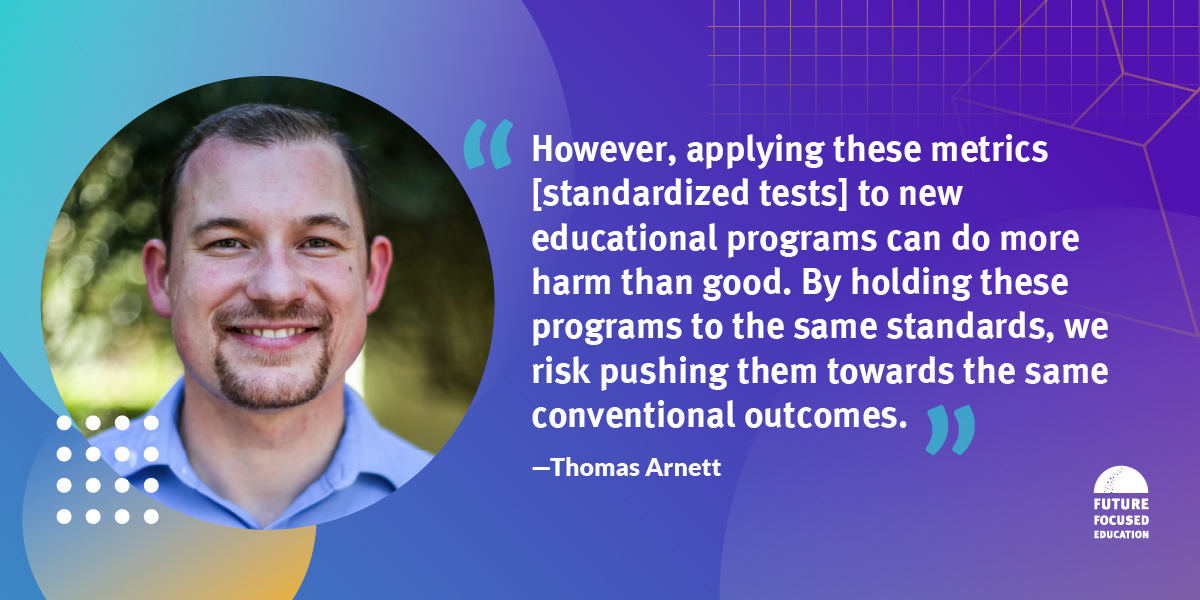
Becky Pringle, National Education Association
“Educators know standardized tests narrow the curriculum,” says Beck Pringle. “We know they limit our ability to accurately assess comprehensive student learning, and they only examine proficiency in distinct content area standards.”
Pringle is president of the National Education Association, the nation’s largest labor union. Becky is a middle school science teacher with more than three decades of classroom experience and has distinguished herself as a fierce social justice warrior and defender of educator rights. When we asked her what she thought about standardized testing and capstones, this is what she had to say:
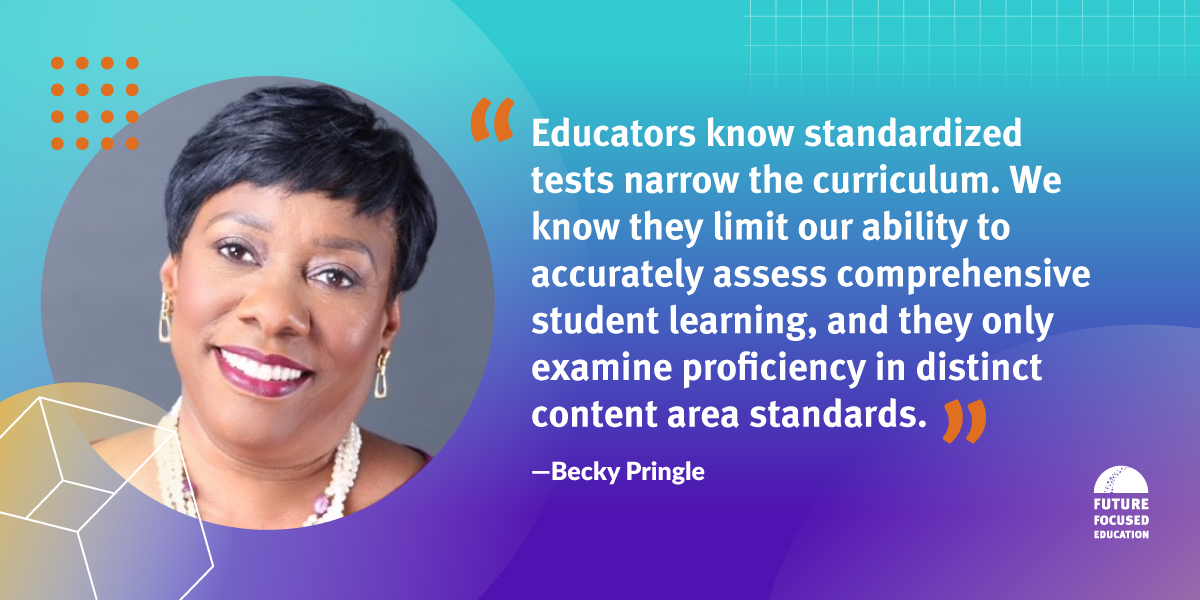
“As president of the National Education Association, and as an educator with more than three decades of experience, I am thrilled by the state of New Mexico’s support of high-quality capstones. Grounded in cultural and community values, these authentic assessments set the stage for students and educators to become partners exploring critical issues through the lens of their lived experiences.”
“These capstone projects represent the future of assessment. Through presentations and exhibits, students are able to provide tangible evidence of their accomplishments, and their work is seen by the ecosystem that supports them: families, business owners, school leaders, community organizations, and more. No standardized test does that. Above all, capstone projects create a learning environment that leads the way toward the deep knowledge and critical, universal skills they all need to step fully into their brilliance.”
For More About Future Focused’s vision for assessment and accountability, check out the following articles:
Educator Development:
How NM's State Department is Transforming Assessment
The Case for Capstones:
Senior Capstones are Replacing Bubble Tests
Capstones are not Harder to Grade
How to Make Senior Capstones Truly Anti-Racist
The Future of Assessment:
What Should the Future of Assessment Look Like
EQ2 Initiative:

